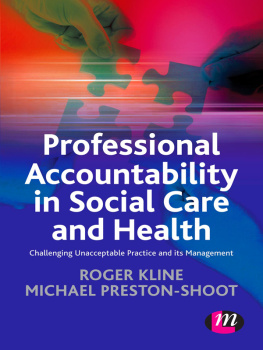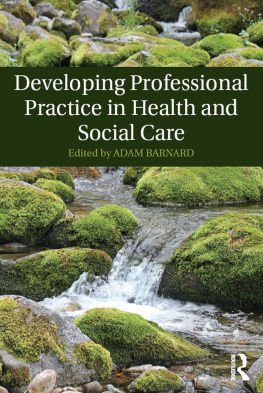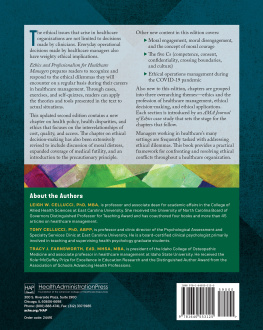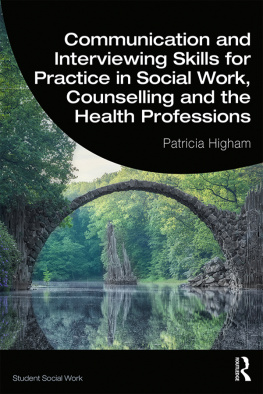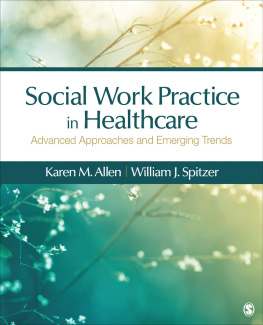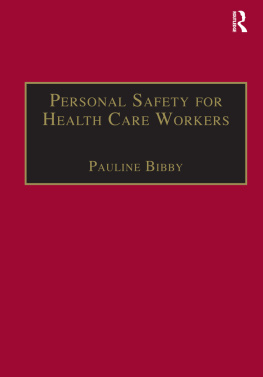Professional Accountability
in Social Care and Health
Creating Integrated Services titles in the series
| Children as Victims | ISBN 978 1 84445 136 4 |
| Effective Communication and Engagement with Children and Young People, Their Families and Carers | ISBN 978 1 84445 265 1 |
| Leadership and Management in Integrated Services | ISBN 978 1 84445 204 0 |
| Professional Accountability in Social Care and Health | ISBN 978 0 85725 689 8 |
Professional
Accountability in
Social Care and Health
Challenging Unacceptable Practice and its Management
ROGER KLINE
and
MICHAEL PRESTON-SHOOT
Learning Matters
An imprint of SAGE Publications Ltd
1 Olivers Yard
55 City Road
London EC1Y 1SP
SAGE Publications Inc.
2455 Teller Road
Thousand Oaks, California 91320
SAGE Publications India Pvt Ltd
B 1/I 1 Mohan Cooperative Industrial Area
Mathura Road
New Delhi 110 044
SAGE Asia-Pacific Pte Ltd
3 Church Street
#1004 Samsung Hub
Singapore 049483
Editor: Luke Block
Production controller: Chris Marke
Project management: Swales & Willis Ltd,
Exeter, Devon
Marketing manager: Tamara Navaratnam
Cover design: Code 5 Design
Typeset by: Swales & Willis Ltd, Exeter, Devon
Printed by: TJ International Ltd, Padstow,
Cornwall
2012 Roger Kline and Michael Preston-Shoot
First published 2012
Apart from any fair dealing for the purposes of research or private study, or criticism or review, as permitted under the Copyright, Designs and Patents Act, 1988, this publication may be reproduced, stored or transmitted in any form, or by any means, only with the prior permission in writing of the publishers, or in the case of reprographic reproduction, in accordance with the terms of licences issued by the Copyright Licensing Agency. Enquiries concerning reproduction outside those terms should be sent to the publishers.
Library of Congress Control Number:
2011945610
British Library Cataloguing in Publication data
A catalogue record for this book is available from the British Library
ISBN 978 0 85725 847 2
ISBN 978 0 85725 689 8 (pbk)
Contents
About the authors
Roger Kline has been a trade union official for 24 years working for eight unions in health, social care, education, airlines, the voluntary and private sectors. He has represented staff at every level on many of the issues discussed in this book and written extensive guidance and developed training on professional accountability, how to raise concerns, organising at work, health and safety, and how to challenge discrimination and bullying at work. He has represented whistle blowers from students to very senior managers. He is currently a member of the Social Work Reform Board, and has recently become a special adviser to Public Concern at Work.
Michael Preston-Shoot is Professor of Social Work and Dean of the Faculty of Health and Social Sciences at the University of Bedfordshire. He is an Independent Chair of a Local Safeguarding Children Board and a Local Safeguarding Adults Board. He is one of the founding editors of the journal Ethics and Social Welfare, having previously been editor of Social Work Education and Managing Editor of the European Journal of Social Work. He has specialised as a social work academic in researching and teaching social work law. His most recent research and writing also spans the governance of safeguarding adults and children, and adults who self-neglect. He is an elected Academician of the Academy of Social Sciences and a past chair of the Joint University Council Social Work Education Committee.
Acknowledgements
We would like to thank a group of critical friends with whom we met or corresponded on several occasions to ensure the book addressed and adequately responded to issues faced by practitioners, managers and their advocates. They are: Tina Mackay, Sarah Carpenter, Gerard Looker, Robert Carter, Claire Dent, Russ Escritt, John Bamford and Yvonne Cleary. Sadly Tina Mackay died whilst this book was being completed.
We acknowledge the anonymous contributions of individual practitioners and managers who have shared their lived experience of work with us and sometimes relied on our advocacy, support and advice. Many of their experiences have helped to shape the motivation behind this book and the examples used within it.
We remain grateful for the support of our work colleagues, particularly Lesley Baillie, Sharon Black, Judith Chappell and Amanda Thorpe at the University of Bedfordshire, who commented on drafts of several chapters.
Finally we express our continued thanks to our families: Naledi, Laura and Leah, and Suzy, Hannah and Sebastian.
Introduction
All of us will depend, at some points in our lives, on the services of health and social care professionals. How health and social care professionals respond will be crucial to our health and well-being. How we respond will depend, partly, on the degree to which we feel confident in relying upon their knowledge and skills, in trusting that they will behave ethically and lawfully, and in sensing that the environment in which they are working is open, accountable, safe and supportive. All of us will have images of what characterises a sound professional encounter, in which the relationship is personalised and shaped by respect, dignity and concern.
All of us who work in the social and healthcare professions will have come to appreciate what differentiates valued as opposed to unsettling places of work. It may revolve around the degree to which workloads feel manageable and the support received to develop our preparedness to meet challenges. It may centre on the degree to which we feel our advocacy for those with whom we work is valued, enabling us to make a real difference in terms of service development and the provision of quality care and support. We may be exercised by how to raise concerns, for example about an organisations attention to equality, human rights and respect, or by whether to request or share information that might otherwise remain confidential. Essentially, how we experience particular places of work may depend on the degree to which it is possible to profess the values, knowledge and skills for which we have trained and been employed, and to exercise in full our duty of care towards those with whom we work.
Many of us who work in and around the social and healthcare professions had personal and professional motivations for engaging with a particular career choice. Particular ethical commitments may well have been important, coupled with building relationships through which valued outcomes, centred on health and well-being, might be achieved. The degree to which these original and ongoing motivations and inspirations have proved compatible with how regulatory authorities and employing organisations envisage professional accountability is a theme that runs through the book. You will be invited to consider the complexities and contrasts between expressions of professional values, knowledge and skills, employer requirements and expectations, and the outcomes of practice and its management. This is why the books title not only draws readers into thinking about how to conceptualise, assert and maintain professional accountability for their work, but also alerts them to the unacceptable face of some practice, and its management, and the importance of thinking through how to conceive and advocate for quality standards.

